Did you know around 15% of Maine Coon cats might get urinary tract issues? It shows how important it is to care for these special felines. You can help reduce this risk with the right care.
To keep a Maine Coon Cat’s bladder healthy, use different methods. This includes seeing a vet often, picking the right food, and changing how they live. As a good pet owner, you should watch for any changes in how your cat acts. This way, you and your vet can make a plan to help.
It may take a lot of time and effort, but your cat’s health is worth it. A healthy cat is a happy cat, after all.
Key Takeaways
- Maine Coons have a notable incidence of urinary issues, necessitating attentive care.
- Regular vet consultations are crucial for early detection and effective management of urinary issues.
- Diet plays an essential role in managing Maine Coon Cat urinary issues.
- Increasing water intake is vital for maintaining urinary health in Maine Coon cats.
- A combined approach involving medical, dietary, and lifestyle interventions is most effective.
- Close observation of your cat’s behavior can help in early identification and prompt treatment of urinary problems.
Understanding Maine Coon Cat Urinary Problems
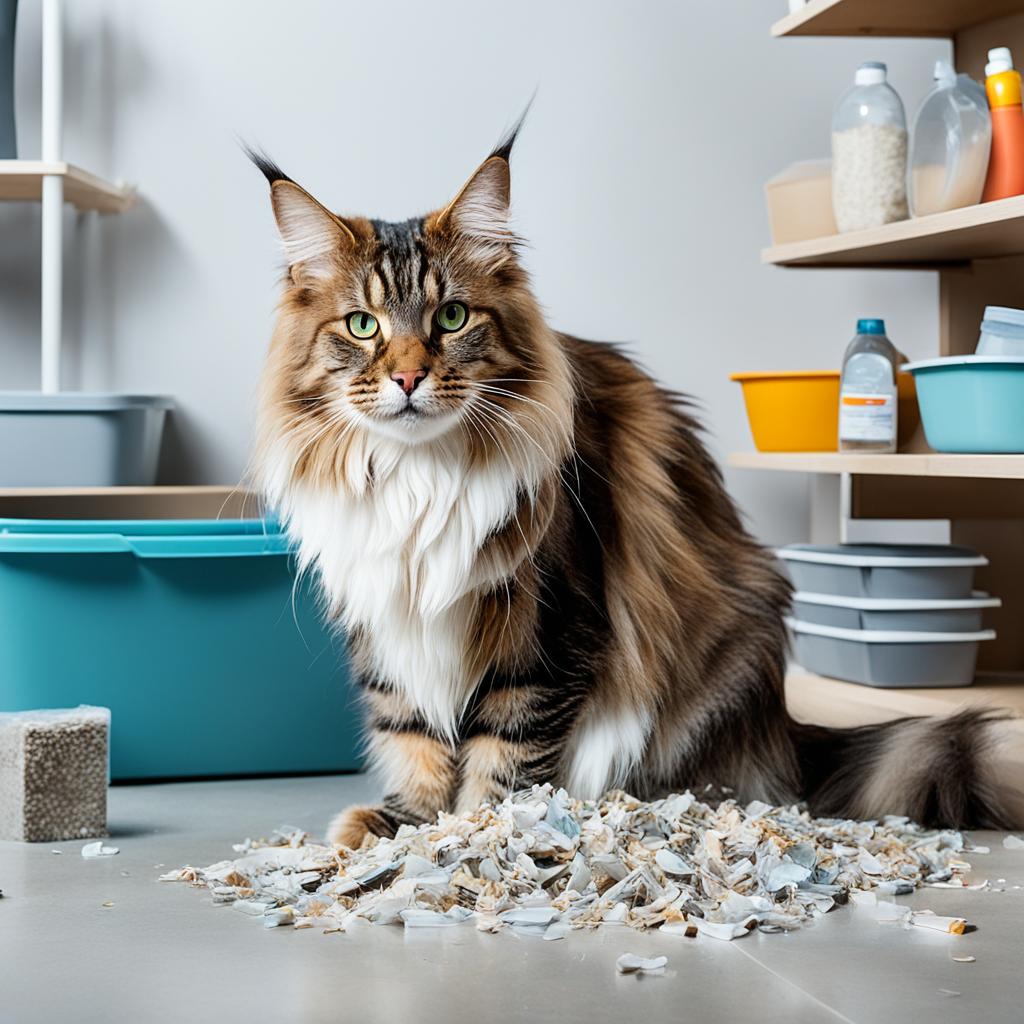
Maine Coon cats can face serious urinary issues. These problems can vary from mild to very serious conditions. It’s important to understand the signs and reasons behind these problems.
Common Symptoms to Watch For
Spotting the signs of urinary problems in a Maine Coon is key. Look out for these symptoms:
- Straining to urinate or vocalizing in pain
- Urinating in small volumes
- Frequent or urgent trips to the litter box
- Discolored or blood-tinged urine
- Licking the genital area more than usual
These signs could mean your cat has an infection or stones. If you notice any, getting your vet’s advice for treatment is very important.
Why Maine Coons are Prone to Urinary Issues
Maine Coons have a higher risk of urinary problems. This can be due to several reasons:
- Genetic Predisposition: Their genes could make them more likely to have these problems.
- Diet: The food they eat significantly affects their urinary health. Foods high in certain minerals can cause stones.
- Stress: Stress can make urinary problems worse for Maine Coons.
Knowing these facts helps you prevent urinary issues in Maine Coons. Regular vet visits, a good diet, and keeping stress low are important. They help keep your cat healthy and happy.
The Role of Your Vet in Diagnosing and Treating Urinary Issues
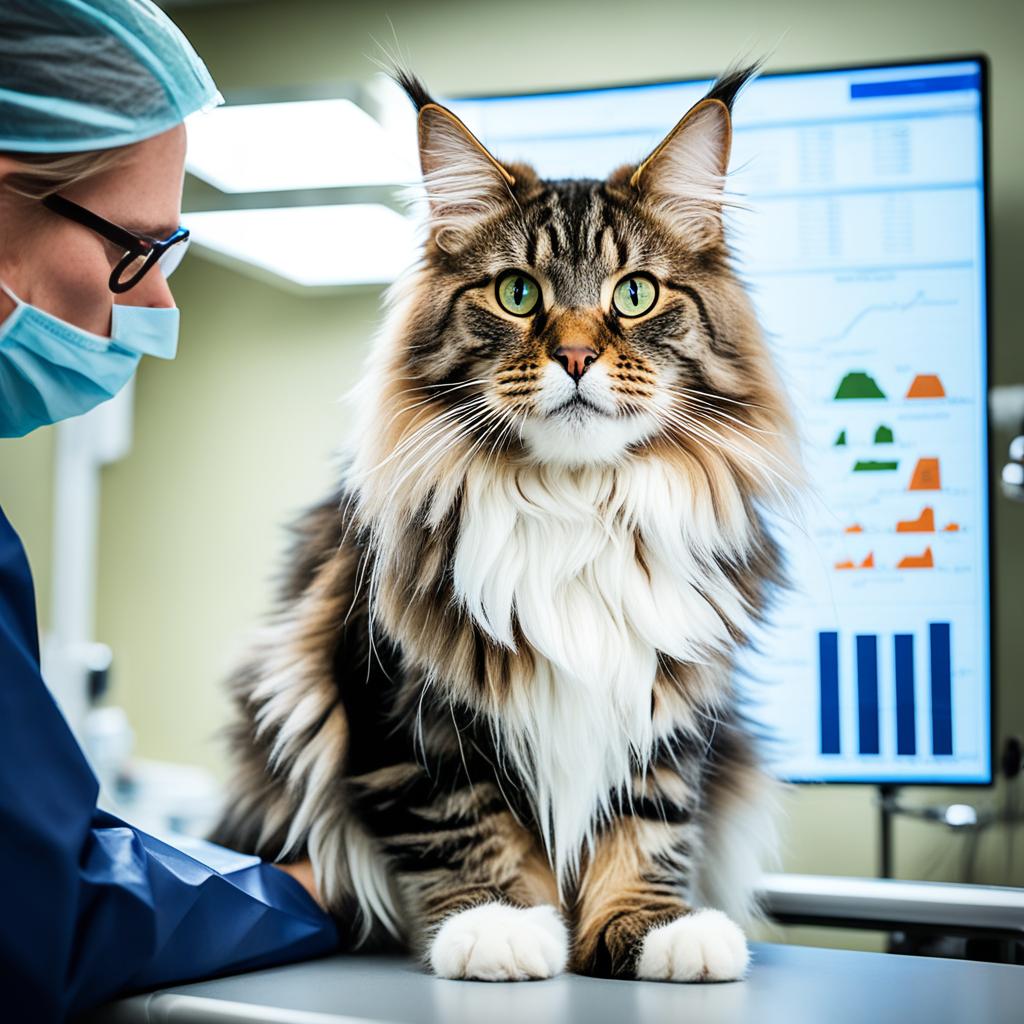
Your vet is key in keeping your Maine Coon healthy, especially concerning their urinary health. When noticing any urinary problems, seeing your vet right away is crucial. This starts a teamwork approach to keep your cat’s health on track.
Initial Vet Consultation: What to Expect
At the first vet visit about your cat’s urine, expect a detailed check. Your vet will look closely, asking you lots about your cat. This info helps set the stage for figuring out the issue.
Diagnostic Tests and Procedures
Figuring out the issue often needs tests. A urinalysis and possibly an ultrasound are usually the first steps. These tools shed light on what’s going on in your cat’s urinary system.
Surgical Interventions for Severe Cases
Sometimes, surgeries are needed for hard cases. For instance, stone removal could be necessary. After surgery, a care plan focuses on stopping the issue from coming back. Dietary changes and regular vet visits help maintain your cat’s urinary health.
| Consultation Phase | Action | Outcome |
|---|---|---|
| Initial Vet Visit | Physical Exam, Symptom Discussion | Preliminary Diagnosis |
| Diagnostic Testing | Urinalysis, Ultrasound | Confirmation of Issues |
| Surgical Intervention | Stone Removal Surgery | Symptom Relief |
| Post-Surgical Plan | Diet Adjustments, Regular Check-ups | Prevent Recurrence |
From the first visit to any possible surgery, your vet does a lot. Their expertise and care are vital for your Maine Coon’s urinary health. They ensure your cat enjoys a long and happy life.
Dietary Adjustments for Better Urinary Health

Choosing the right diet for your Maine Coon is essential for good urinary health. The right food and plenty of water can prevent many problems. Here, we guide you on what to feed and how to increase water intake.
Choosing the Right Cat Food
Choosing the right cat food is vital in preventing Maine Coon Cat urinary problems. Look for food that supports urinary health. Brands like Hill’s Science Diet and Royal Canin make such foods. Always talk to your vet before changing your cat’s diet. They can help you match the food to your cat’s unique needs.
Hydration Tips: Increasing Your Cat’s Water Intake
Hydration is key for keeping your Maine Coon’s urinary system healthy. Wet food is a great way to add water to their diet. Also, have fresh water available in several places at home. A few cats like water fountains or water with a little flavor to encourage drinking. These simple steps can do a lot for your cat’s urinary health.
| Tip | Benefit |
|---|---|
| Wet Food | Increases hydration, lowering the risk of urinary crystals |
| Fresh Water Sources | Encourages more frequent drinking |
| Flavored Water | Enhances water intake for fussy drinkers |
How to Address Maine Coon Cat Urinary Issues?

If your Maine Coon is having urinary problems, start by going to the vet. They will need to check the cat to know what’s wrong. This is important for finding the right treatment. Follow these steps:
- Consult Your Vet: Make an appointment with your vet. They’ll check your cat’s urine and perhaps use an ultrasound to see the problem clearly.
- Prescription Diets: Your vet might recommend a special diet. This diet can make your cat’s urine healthier. It also stops the formation of stones.
- Increase Water Intake: Maine Coons need lots of water. Make sure they drink a lot. You can use wet food and many different water bowls to help.
- Medications and Surgery: Sometimes, the treatment is more complicated. It could involve medicine or even a surgery to help the cat feel better.
- Ongoing Monitoring: Keep up with regular vet visits. This is crucial for your cat’s health. It lets the vet tweak the treatment as needed.
Looking out for your Maine Coon means sticking to the treatment plan. Regular vet check-ups and quick adjustments to the treatment can make a big difference. Working together with your vet is the key to keeping your Maine Coon happy and healthy.
Home Remedies and Lifestyle Changes
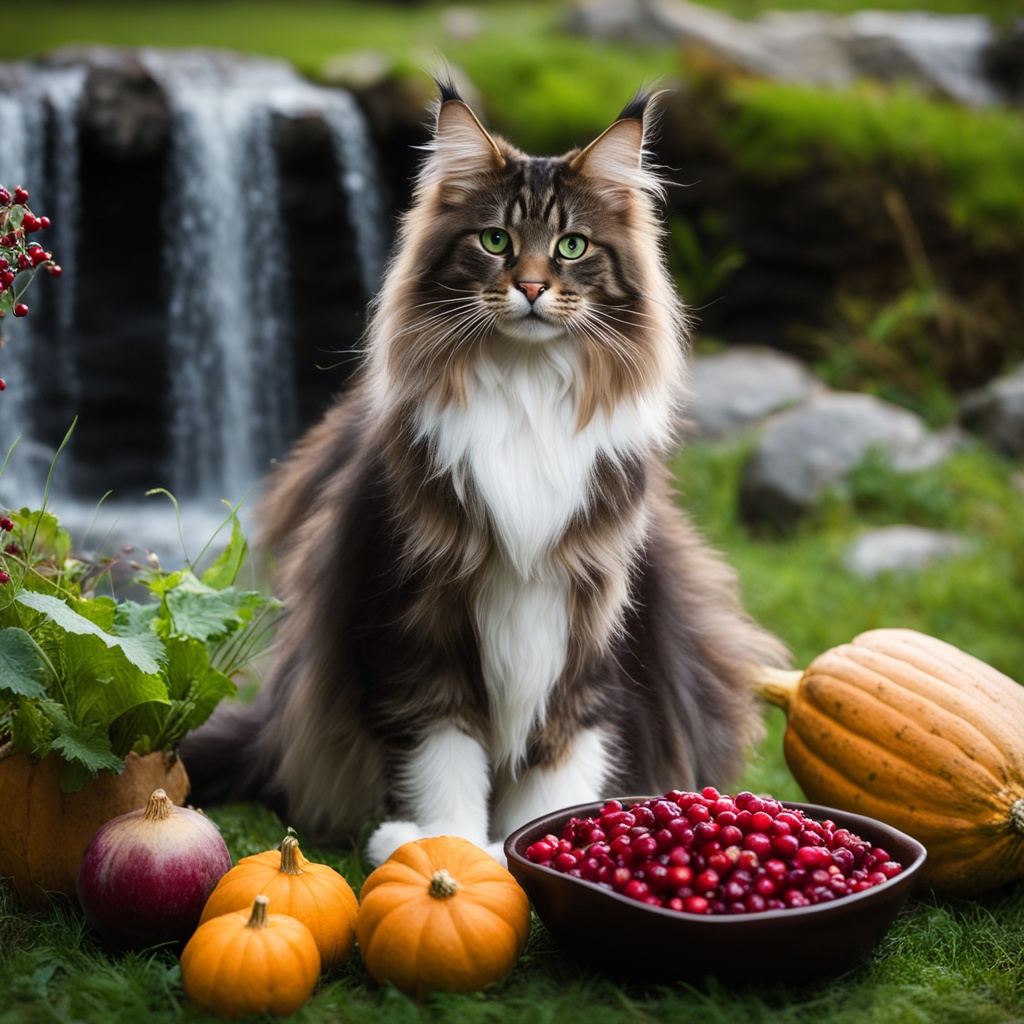
Keeping your Maine Coon healthy is key, and some easy changes can help a lot. Start with making sure they don’t carry extra weight. This can ease pressure on their bladder, keeping them healthier.
Get your cat moving more. Play with them using fun toys every day. This helps them stay in shape and lowers stress.
Make your home a calm place. This is crucial for reducing stress in your cat, experts say.
“Stress is the top contributor to feline urinary issues. Lowering stress can significantly improve your Maine Coon cat urinary health,”
suggests many feline experts.
Changing your cat’s environment is also important. Give them plenty of clean litter boxes and place them in quiet spots. Keep them away from fights with other cats. Using pheromone diffusers can also help. These gadgets mimic natural cat pheromones, helping your cat feel secure.
Always talk to your vet before trying home remedies. They’re the best to help you manage your cat’s urinary problems properly and safely.
Managing Stress to Prevent Urinary Problems
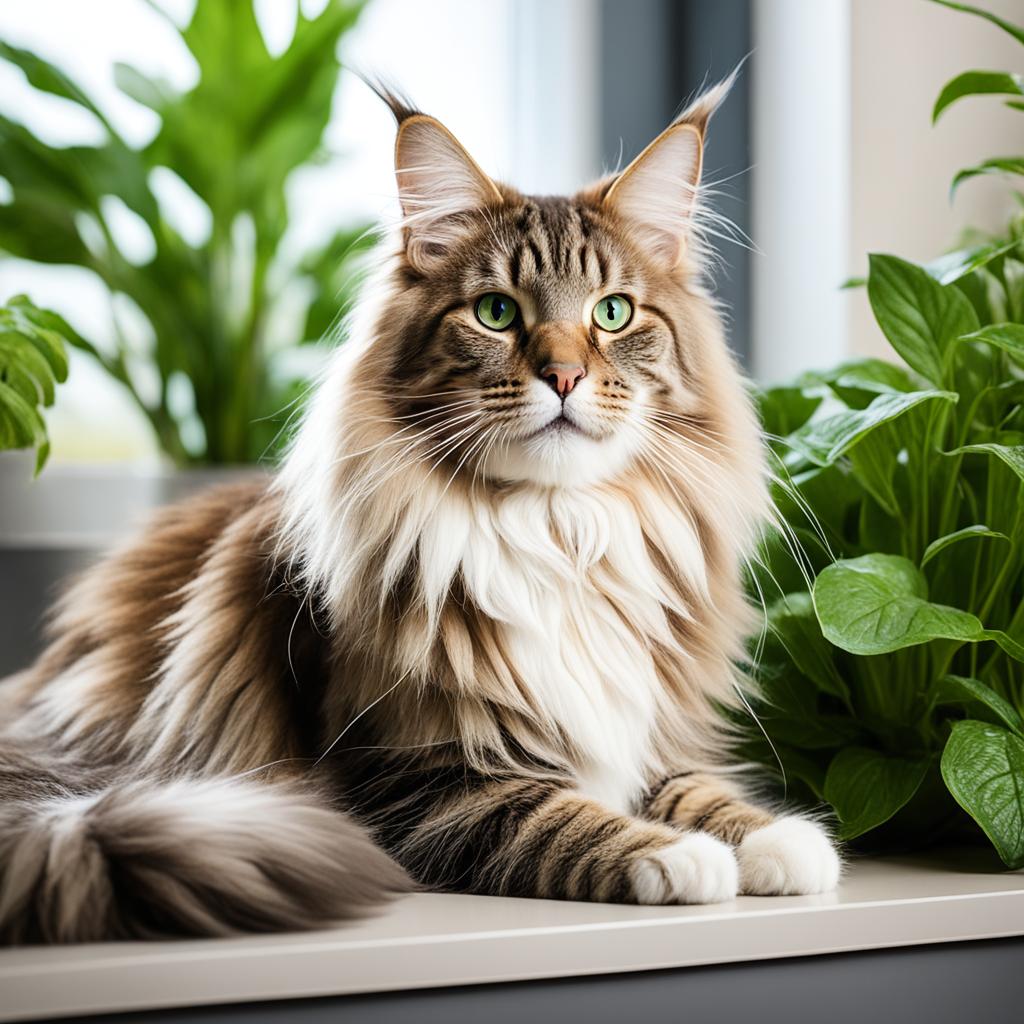
To keep your Maine Coon Cat’s urinary health in check, watch their stress levels. Stress can lead to urinary problems. So, a calm and stable space is key for them.
Identifying Stress Triggers
First, spot what makes your cat stressed. This includes things like new pets, moving, or any big changes. Catching these signs early helps you act fast.
Environmental Modifications to Reduce Stress
Building a safe place is important for your Maine Coon. Offer quiet spots, use calming pheromones, and keep their litter box clean. These steps play a big role in stress-reduction and health.
Using Anti-Anxiety Products and Medications
If changes at home don’t help, look into anti-stress products or meds. Talk to your vet to find what works best for your cat. Solutions might range from supplements to special sprays or drugs.
Preventing Future Urinary Issues
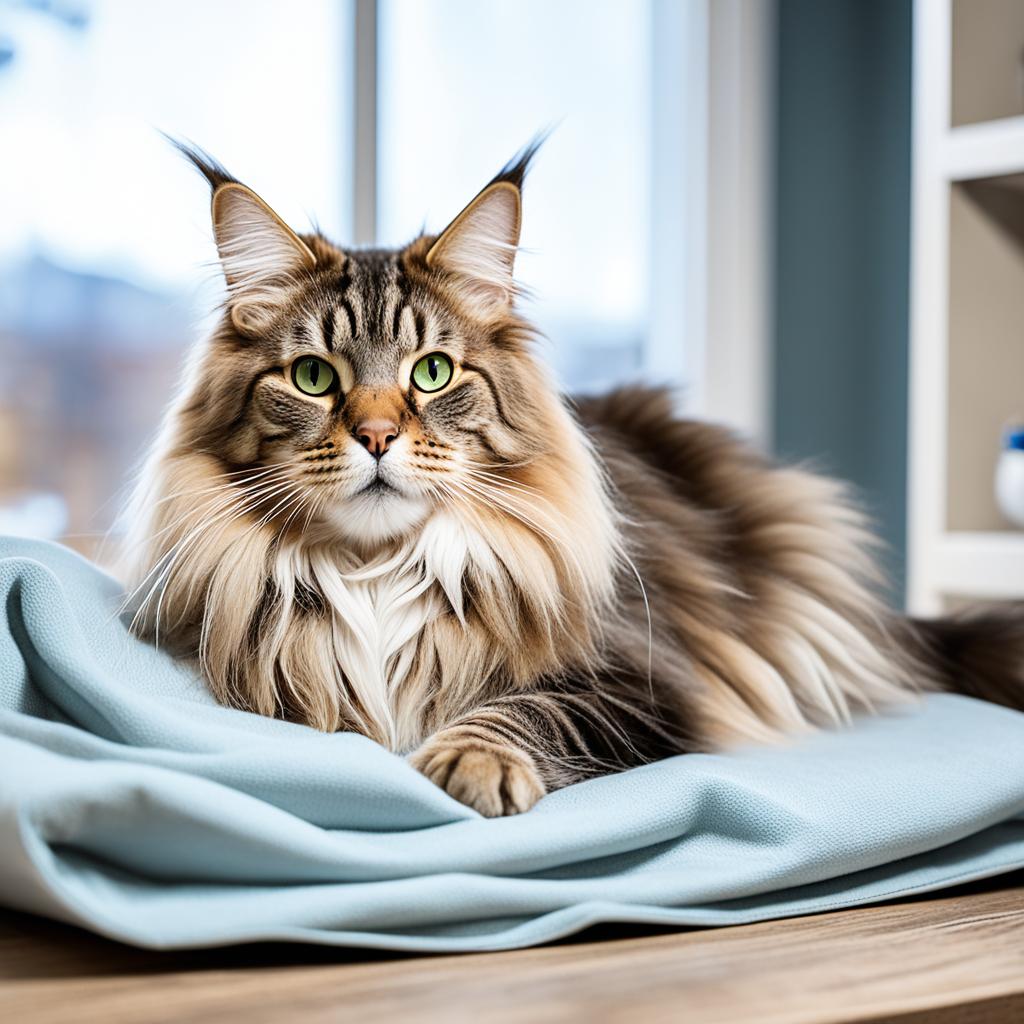
To keep your Maine Coon cat healthy and free from urinary problems, take a proactive approach. This includes regular check-ups at the vet. It also means focusing on a healthy diet and lifestyle.
Regular Veterinary Check-Ups
Getting your Maine Coon to the vet regularly is key. These visits can catch any urinary issues early. A vet can quickly treat any UTIs your cat may get.
A vet can keep an eye on your cat’s health. This helps prevent problems down the line.
Proactive Diet and Lifestyle Maintenance
The food your cat eats is very important for its urinary health. Choose foods that help maintain a healthy bladder.
It’s also vital to make sure your cat drinks plenty of water. You can do this by feeding them wet food and always having fresh water available.
Letting your cat play a lot and keeping its environment stress-free is also crucial. These measures help a lot in preventing urinary issues.
“Prevention is better than cure,” is especially true for urinary health in Maine Coon Cats. Simple, regular care makes a big difference.
Following these tips should help your cat’s urinary health a lot. Consistent care in diet, water, and visits to the vet is key. This will keep your furry friend healthy and happy for many years.
Special Considerations for Maine Coon Cats
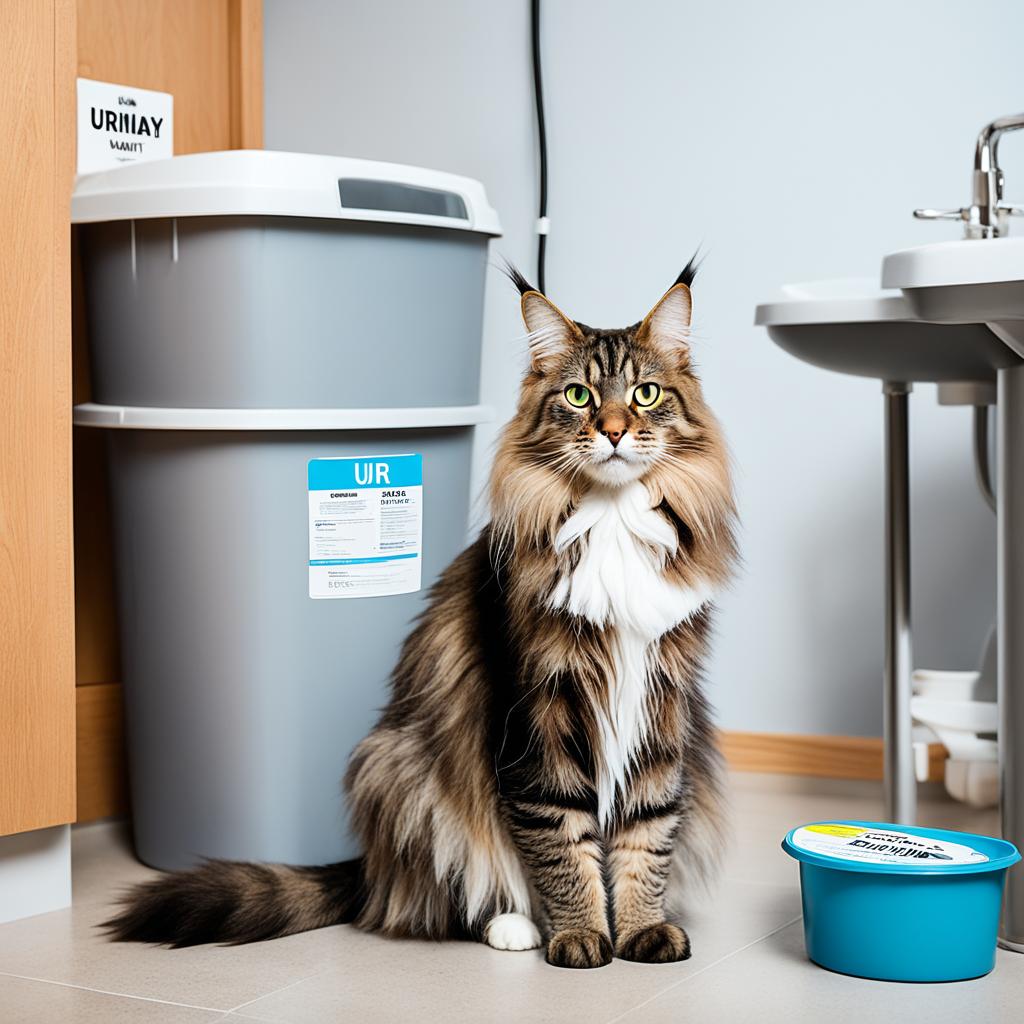
Majestic Maine Coon cats need special care. They have some unique traits and health needs. Because of their size and genetics, they may face urinary issues. Learning about these can help you look after your cat better.
Behavioral Factors
Maine Coons love to play and can sometimes get into trouble. What they do matters for their health. Watch out for any changes, like being more aggressive or not using the litter box. Early signs like this can warn you of a possible problem. Giving them fun toys and safe zones can lower their stress and help avoid urinary issues.
Size and Genetic Predispositions
Aside from being adorable, Maine Coons’ size and genes might put them at risk for urinary problems. It’s why seeing the vet regularly is so important. A diet made for big cats can also be a big help in keeping them healthy.
| Consideration | Impact on Urinary Health | Recommendations |
|---|---|---|
| Behavioral Changes | Increased stress and avoidance of litter box | Monitor behavior, provide engaging toys, and create safe spaces |
| Large Size | Prone to developing urinary tract issues | Frequent vet check-ups, balanced diet, and hydration |
| Genetic Predispositions | Higher risk of urinary problems | Regular screenings and preventive lifelong care |
Focusing on your Maine Coon’s specific needs can help prevent urinary issues. This approach might mean less need for UTI treatments in the future.
Conclusion
It’s important to know how to deal with urinary issues in Maine Coon Cats. This knowledge helps keep your cat happy and healthy. Learn about their special needs to prevent problems.
Choosing the right food is crucial. A diet that’s full of nutrients and aids urinary health is best. Also, make sure your cat drinks enough water to lower the risk of issues.
Reducing stress is also key. Make your cat’s home more enriching and use products that calm them. By doing this, you’re not just fixing problems; you’re ensuring your cat’s well-being. So, follow these steps and ensure your Maine Coon has a great life.
FAQ
What are the common symptoms of urinary problems in Maine Coon cats?
Watch for signs like struggling when peeing, urine that looks odd, peeing a lot, and being uncomfortable.
Why are Maine Coon cats prone to urinary issues?
Maine Coons might inherit a risk for these issues. What they eat and how stressed they are also count.
What should I expect during an initial vet consultation?
At first, the vet will look at your cat all over. You’ll talk about what’s wrong. They might run tests like checking the urine or using ultrasound.
What diagnostic tests might be performed?
Along with a check of your cat’s urine for infections, there’s often an ultrasound. This helps spot any stones or other problems in the structure of the urinary system.
Are there surgical interventions for severe urinary issues?
Sometimes, surgery to take out stones is needed. After that, a plan helps keep the problems from coming back.
What kind of dietary adjustments can help with urinary health?
Special diets that limit certain minerals and keep the urine balanced can be good. Your vet can recommend the best ones.
How can I increase my Maine Coon’s water intake?
Giving them wet food is a good start. Also, make sure they have plenty of clean water and you can add taste to the water.
How can I manage urinary issues in my Maine Coon cat?
It begins with a vet’s help. Then, treatment might involve special diets, more water, pills, or even surgery if it’s serious.
Are there home remedies for managing urinary issues?
You can help by watching their weight, keeping them active, and making their living space calm. Always ask the vet first.
What are common stress triggers for Maine Coon cats?
Big changes at home like a new pet, moving, or even rearranging the house can upset them. Finding and stopping these issues can make a big difference.
How can I modify the environment to reduce my cat’s stress?
Give your cat places to hide and make sure different cats can avoid each other. You can also use diffusers that release calming scents.
What anti-anxiety products or medications can help?
Things like calming sprays and certain drugs can help your cat feel less anxious. Your vet can suggest the best choices.
How can I prevent future urinary issues in my Maine Coon?
Keep taking your cat to the vet, feed them well, and make changes in their life if needed. This can stop many problems from happening.
Are Maine Coon cats’ size and genetic makeup relevant to urinary issues?
Yes, their big size and what they might get from their parents can make urinary health an extra worry. But, with the right care, you can keep them healthy.




